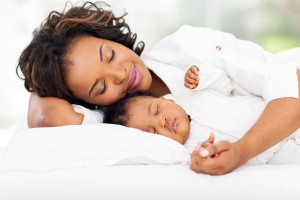 Co-sleeping, or sleep sharing, is practiced by families around the world. Having your baby sleep in bed with you can bring several benefits, including stronger bonds and greater convenience—especially for those middle-of-the-night feedings.
Co-sleeping, or sleep sharing, is practiced by families around the world. Having your baby sleep in bed with you can bring several benefits, including stronger bonds and greater convenience—especially for those middle-of-the-night feedings.
However, it’s vital to understand and practice safe co-sleeping, since this arrangement can increase your baby’s risk of SIDS (Sudden Infant Death Syndrome) if it’s not done correctly. Once your family has agreed to give sleep sharing a try, follow these tips to keep your little one safe and healthy in your co-sleeping arrangement.
Basic safety for sleep sharing
Keep in mind that adult beds aren’t designed with infants in mind—never leave your baby sleeping in an adult bed alone. If the infant sleeps before you’re ready for bed, have a crib or bassinet for her until you turn in for the night.
Also, whether laying your child down in a bassinet or bed, always place babies on their backs to sleep. This position decreases the risk of SIDS.
Bed safety for co-sleeping
- Use only a smooth, flat mattress—never put a baby to sleep on an egg-crate or foam mattress, waterbed, couch, or other surface that isn’t firm.
- The ideal co-sleeping bed is a mattress on the floor. If yours isn’t, install mesh bed rails on any edge that isn’t along a wall—and check the bed daily to make sure the mattress is firmly against the wall.
- Avoid headboards and footboards with slats or cutouts, as an infant’s head can get trapped in them.
- Keep blankets, pillows, and other bedding away from baby’s face.
Room safety for co-sleeping
- Do not smoke or allow others to smoke around your baby, since this increases the risk for SIDS.
- Childproof your co-sleeping room, as eventually your little one will be able to get out of bed and explore.
Companion safety for co-sleeping
- Sleep sharing is highly risky for parents who are extremely overweight, or heavy sleepers who don’t wake easily. Consider a co-sleeping bassinet for these circumstances.
- Babysitters, older siblings, and non-parents should not practice co-sleeping, as infants respond better to parents—and non-parents may not share the protective instincts that prevent them from accidently harming the baby.
- Never co-sleep with your baby while extremely exhausted, or while under the influence of intoxicants like alcohol or drugs.
- Don’t wear jewelry or bed clothes with long strings or ribbons in the family bed.
Most sleep sharing safety tips are a matter of common sense. Think about the possibilities that would harm your baby, and take steps to avoid them through the night to make co-sleeping work for you and your family.
















-300x225.jpg)
